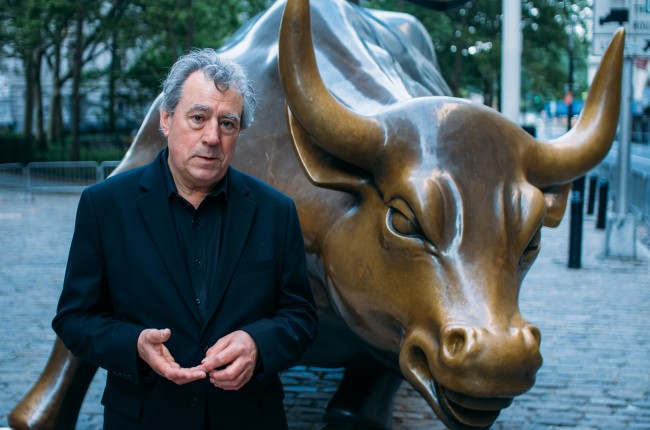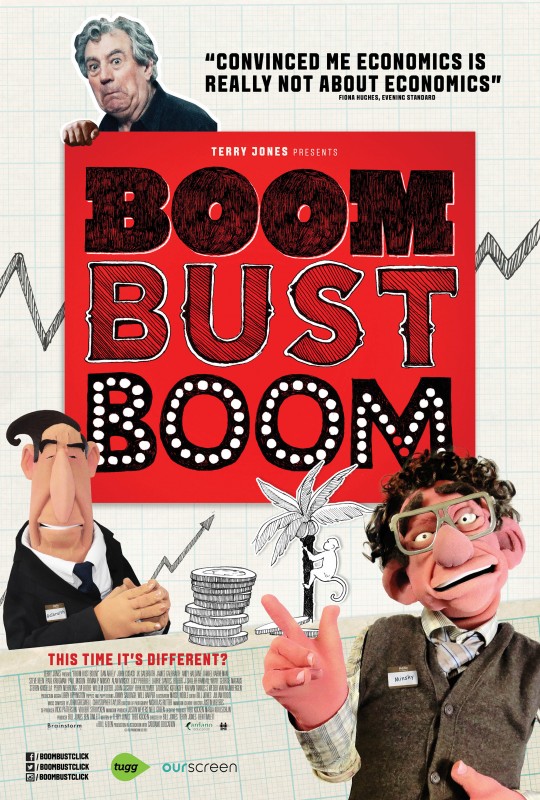By James Hancock March 7th, 2016
In one of the best documentaries you are likely to see all year, Boom Bust Boom tackles the 2008 subprime mortgage crisis with the perfect balance of gallows humor and intellectual rigor. Hosted by Monty Python veteran Terry Jones (who also co-directed the film alongside Bill Jones and Ben Timlett), Boom Bust Boom questions important assumptions made by economists about human behavior, namely that human beings can be expected to behave rationally. Using a combination of animation, puppetry, musical numbers and traditional documentary material, the film expertly weaves its story through several financial crises and market crashes going all the way back to the 1600s with the famous Dutch Tulip Mania Bubble where speculation drove the price of tulips to obscene highs before the bubble inevitably popped. What we see is a pattern emerging where people in general do not behave like long term investors, but rather like irresponsible speculators who may or may not recognize bubbles as they form but dive into the latest trend all the same with the hope that they will not be one of the unlucky suckers hanging onto an overvalued asset when the price finally crashes back to normal. As depicted in the film, the boom bust boom cycle appears to be one destined to repeat itself in perpetuity unless we can find a way to usher in a seismic shift in the way we approach economics by taking a long hard look at the destructive tendencies of human behavior.
What is incredible about the financial crisis of 2008 is how few people to this day are able to articulate in layman’s terms what drove our financial markets right over the cliff. To help on this front, Terry Jones invites a wide variety of perspectives including Nobel Prize winners Daniel Kahneman, Robert Shiller and Paul Krugman as well as Chief Economist of the Bank of England, Andy Haldane. What becomes clear is that so many of our existing economic models and strict ideologies are inherently flawed, best illustrated in Allen Greenspan’s famous admission before Congress in 2008. The most dangerous assumption of all is that we have built an economic system that will prevent a calamity like the Great Depression from ever happening again. Human beings seemed trapped in a cycle where they forget the lessons learned from one crisis just in time to lay the groundwork for the next crisis to come. Even more alarming is the abundant evidence we see in the film that times of economic prosperity nearly always lead to a crisis. Typically in the immediate aftermath of a financial crisis, people are inclined to reduce their debts while the government steps in with increased regulation. But as a crisis recedes into memory, investors take on more debt in order to finance riskier strategies while the regulations meant to keep speculation in check magically begin to evaporate. Boom bust boom, rinse repeat.
If the documentary sounds too much like homework, I assure you that the film does an excellent job of keeping the audience entertained even if one is utterly uninterested in or completely bewildered by economics. In one brilliant sequence, an associate professor of psychology and cognitive science at Yale conducts an elaborate experiment where we see just how little separates us from an island of monkeys. We see what happens to their behavior when they are introduced to a currency that allows them to buy fruit from humans who do not always trade with the monkeys in a fair, transparent manner. Not only is the response by the moneys irrational, the response is strikingly familiar with that of our fellow human beings. So while I might still struggle to explain the 2008 crisis in simple terms, I thoroughly enjoyed this highly entertaining lesson on human behavior. Without a thorough understanding of our history of self destructive tendencies, we are bound to repeat the mistakes of the past. Boom Bust Boom is smart entertainment as well as a cautionary tale that will leave its audiences laughing and terrified in equal measure. A crisis like the one we endured in 2008 is not something I am eager to repeat anytime soon. Hopefully, this movie can play a role in averting the next catastrophe to come.
Opening Theatrically on March 11 in New York (Village East Cinema)
followed by release on iTunes and On Demand on March 15
I am one of the Co-Hosts of Wrong Reel and you can find more of our content here:








